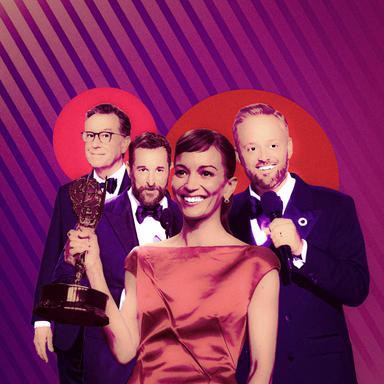The longest-running gag at last night’s 77th Primetime Emmy Awards was that every winner had just 45 seconds to deliver their acceptance speech. Go over that number, and host Nate Bargatze would deduct some money from the $100,000 he’d vowed to donate to the Boys & Girls Clubs of America. That was the joke, anyway—a cheeky attempt to shorten the night’s numerous trips to the stage and rein in the victors who so often treat the podium like a bully pulpit. If no one in the room actually expected Bargatze to deprive a charity for their rambling sins, many of the night’s newly enshrined played along all the same, keeping their tearful remarks to a relative minimum.
Of course, not everyone stayed under the sardonically imposed time limit. Hannah Einbinder was one of a few winners who talked for longer than her sanctioned near minute. At least she found a pointed, purposeful use for those extra seconds. Accepting her first-ever Emmy, for Outstanding Supporting Actress in a Comedy Series, the Hacks star opted to express more than customary gratitude: “Go Birds, fuck ICE, and free Palestine” was how she closed the speech. Live censors successfully bleeped the profanity, but the sentiments came through loud and clear—especially on a night when almost everyone seemed hell-bent on not addressing any elephants in the room.
It was, on the whole, a rather apolitical evening. Bargatze promised as much in the lead-up to the show: “I know there’s heartbreaking stuff that’s been happening right now, but I want this night to be an escape and I think that’s why I was brought on,” the comedian told Entertainment Weekly yesterday before the ceremony. That the words “heartbreaking stuff” could have been a reference to everything from the ICE raids that Einbinder denounced to the killing of Charlie Kirk (which no one mentioned or alluded to all night) is more proof that the squeaky-clean stand-up knows how to gracefully navigate around hot-button topics. He was a fundamentally inoffensive choice for master of ceremonies—the kind of host you can count on not to rock the boat. And his politely self-effacing, noncontroversial brand of comedy set the tenor of a night that saw the consuming horrors of contemporary American life fade almost entirely into the background, unremarked on.
Einbinder’s closing remarks were a rare reminder of What’s Going On Right Now at the ceremony, which seemed nervously, pathologically determined to ignore all that—in part by explicitly removing itself from the present moment as often as possible. At times, it seemed like the organizers were set on celebrating every year except 2024 or 2025, the ones the awards were honoring. The show opened with a comic flashback to the invention of TV itself—an event Bargatze dramatized in the style of his popular SNL sketch about the fabled origins of America, except this time without Kenan Thompson on hand to lend the silly jabs at our country’s logical inconsistencies. If you think that Saturday Night Live plays softball with our divided national moment, last night’s Emmys are proof that the ball can always be softer.
The night was dominated by tributes to TV’s storied past, all straining to get our minds off the present. There was a fresh rendition of the Golden Girls theme, timed to the sitcom’s 40th anniversary. Lauren Graham and Alexis Bledel reminisced about Gilmore Girls. And the big awards of the night, Outstanding Comedy Series and Outstanding Drama Series, occasioned cast reunions—an all-star lineup of Law & Order alums assembling to present the latter, the stars of Everybody Loves Raymond doing some pretty funny shtick to introduce the former. (Brad Garrett’s morbid speculation about his chances of eventually making the in memoriam reel brought some dark humor to a synthetically bright affair.)
Some of the actual awards reflected a pining for a different, perhaps less inflammatory time. That was certainly true when it came to honoring The Pitt, the HBO medical procedural that picked up Outstanding Drama Series. It was a more classical winner than this category has seen in ages—an old-school episodic TV drama in the style of star Noah Wyle’s prime-time megahit ER, which won the same Emmy nearly 30 years ago. (Ironically, it was HBO that largely ended the reign of such 22-episode network award magnets, ushering in a new era of serialized TV-is-the-new-novel winners like The Sopranos.) Voters picked The Pitt over flashier modern options like Severance, whose second season scored more nominations than any other show this year, with 27, and the unmistakably, uncomfortably timely Andor.
There was nothing so explicitly throwback about the other main category’s big winner, The Studio, which entered the night with the most Emmy nominations ever for a freshman-year comedy (23) and exited with the most Emmy wins for any single season of a comedy (13). All the same, you could say that Seth Rogen’s Hollywood satire was dabbling in one of the most time-honored subjects of award show approval: Is there anything showbiz loves more than skewering itself? The show netted Rogen four statuettes, including the first award of the night, Lead Actor in a Comedy Series, and a prize for directing the most showboating episode, the single-take tour de force “The Oner.”
While Rogen’s acting trophy was the first Emmy of his career, Jean Smart racked up yet another in the adjacent Outstanding Lead Actress in a Comedy Series category. It’s her fourth win for Hacks—a streak that lands her within striking distance of Julia Louis-Dreyfus’s record six Emmys for playing Selina Meyer on Veep. That’s a reminder that familiar comforts tend to do well on Emmy night, regardless of whether there’s an unpleasant news cycle to skirt around. So, too, was the latest knee-jerk prize for SNL, whose 50th-anniversary special provided another reason for the Emmys to increase the show’s lead over every other series ever on TV. With 93 wins, the variety institution remains handily the most awarded series in Emmy history, in defiance of the decades-running consensus that it “used to be better.”
Even the more political of the winners kept politics out of their speeches, for the most part. John Oliver, who won another Emmy for a show that’s all about what’s ailing America, curiously said nothing on the subject; instead, he riffed on Bargatze’s acceptance speech instructions by racing through his acknowledgments at warp speed, getting censored only for a jokey “fuck you” to the host at the end. And Stephen Colbert mostly took the high road during his time onstage as presenter and then winner, both joking (“Is anyone hiring?”) and getting sentimental about how his days at The Late Show are numbered … without ever mentioning that his regular, sometimes nightly criticism of Trump is probably the reason why. Likewise, Dan Gilroy declined to emphasize any parallels between his now-award-winning writing on Andor and the fascistic moment into which it’s been released. Fans were thanked, unity was vaguely praised, and current events were conspicuously neglected.
One can’t help but wonder whether the Academy sent a clear message to all invitees that topicality was not welcome. Maybe there was a deeper motive, beyond even the constantly bloated running times of awards shows, to Bargatze’s irreverent plea for brevity: To keep an acceptance speech short was to limit the space for impassioned matters of opinion—to leave only enough for the obligatory roll call of loved ones and costars and agents in need of thanking. Then again, maybe everyone just policed themselves. Colbert’s very public firing, despite high ratings and the regular approval of, yes, the Emmys, was an example made of a celebrity many might have assumed was untouchable. If they can terminate him for speaking his mind, no one’s career is safe. Hollywood, having apparently received the message, cheerfully obliged last night, sticking to the work and the gratitude. Which, of course, makes Einbinder’s willingness to engage with the moment, via parting slogan, all the more daring.
If one wanted a political perspective from the Emmys, they could find it not in the speeches but in the winners themselves. It was there in Severance’s prolabor, anti-corporate sentiments, unobscured by its twisty plotting and sci-fi mystery box mythology. It was there in Andor, a show set a long time ago in a galaxy far, far away, but also right here and right now. And it was definitely there in Adolescence, the British Netflix phenomenon that won eight awards for its vision of how internet culture and manosphere influencers are poisoning the minds of boys. Its portrait of violent radicalization couldn’t be more relevant to the present. And to that end, there was a bitter irony to its string of wins last night: On a night when Hollywood desperately averted its gaze, one of the biggest award recipients was a drama about the consequences of doing just that.

